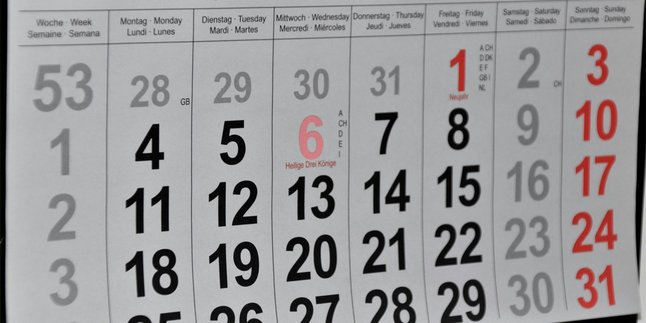Kapanlagi.com - Primbon has become an inseparable part of traditional Javanese society's tradition. Javanese primbon is still used for various purposes, one of which is determining good days, whether for marriage, opening a business, moving houses, and so on. In determining good days in primbon predictions, there is the term 'sandang' (clothing). Therefore, the meaning of clothing in Javanese primbon is important to know.
Searching for good days is a tradition that is still maintained until now. Many believe in auspicious days. In relation to determining good days, the meaning of clothing in Javanese primbon indicates the level of luck.
Curious about the explanation of the meaning of clothing in Javanese primbon for good day predictions? To find out, just read the following review.
1. Understanding Good and Bad Days

Meaning of Sandang in Javanese Primbon Definition of Good and Bad Days (credit: unsplash)
The concept of good and bad days according to Javanese astrology is a concept used in divination to determine the smoothness or luck of an activity or event in life. Javanese astrology believes that each day has different energy or power, which can affect the outcome of an activity.
Good days in Javanese astrology are considered to have positive energy that supports success and progress. On good days, everything tends to go smoothly, whether it's business activities, weddings, moving houses, or other activities.
On the other hand, bad days in Javanese astrology are considered to have negative energy that can cause obstacles or problems in activities. On bad days, everything tends to be hindered, not going according to plan, or even experiencing failure.
2. Meaning of Sandang in Primbon

Meaning of Sandang in Javanese Primbon Good Day (credit: unsplash)
In general, people understand sandang as part of the basic needs of shelter, clothing, and food. In this case, sandang represents the need for clothing. However, in relation to good days in primbon, sandang becomes a term symbolizing good days where every need can be fulfilled.
Therefore, the meaning of sandang in Javanese primbon can be interpreted as a good day that can bring abundant blessings. Therefore, according to primbon, a good sandang day will be a suitable day to start a business.
Additionally, a good sandang day can also be the right time to hold a wedding. It is believed that a good sandang day can bring abundant blessings that can fulfill all the needs of the newlywed couple.
3. Calculating the Auspicious Days

Meaning of Sandang in Javanese Primbon Calculating the Auspicious Days (credit: unsplash)
Understanding the meaning of Sandang in Javanese primbon is important in determining auspicious days according to Javanese primbon. As mentioned earlier, auspicious days are usually sought to start a business, although sometimes auspicious days are chosen for major events such as weddings.
The method to determine auspicious days is very easy. The first step is to choose a day that is considered suitable for starting a business or holding a wedding, then match it with the respective weton, using the formula:
(the value of the chosen day's neptu + the value of the birth weton's neptu) : 5
For example, a person with a weton of Sabtu Pon, then they choose the day of Rabu Legi to start a business. Now, to see the compatibility between the chosen day and their weton, it is as follows:
- Choice of Business Day: Kamis Pon = Neptu value 8 + 7 = 15
- Birth Weton: Sabtu Pon = Neptu value 9 + 7 = 16
If you add up the two neptu values: 7 + 5 + 9 + 7 = 31
After that, divide by 5, the result is as follows: 31 : 5 = 5 remainder 1 (sandang).
In Javanese primbon, each number or remainder is believed to have its own meaning. Therefore, not only the meaning of sandang in Javanese primbon, but in calculating auspicious days there are also other interpretations. For a clearer explanation, here are some meanings of the results of calculating auspicious days according to Javanese primbon:
- Remainder 1 is called Sandang, which means that day can bring abundant fortune.
- Remainder 2 is called Pangan, which means that day can indicate that sufficiency will be achieved.
- Remainder 3 is called Bejo, today can bring goodness and wealth but is not favored by people around.
- Remainder 4 is called Loro, meaning illness and experiencing losses.
- Remainder 5 is called Pati, which means that today signifies that the effort will end in failure or death.
Those are some explanations of the meaning of sandang according to Javanese primbon in the context of auspicious days. Hopefully, it is useful and can answer the curiosity that has been there. For the rest, the decision to believe or not believe is left to the reader. So it is expected to handle it wisely.
(kpl/psp)
Disclaimer: This translation from Bahasa Indonesia to English has been generated by Artificial Intelligence.















